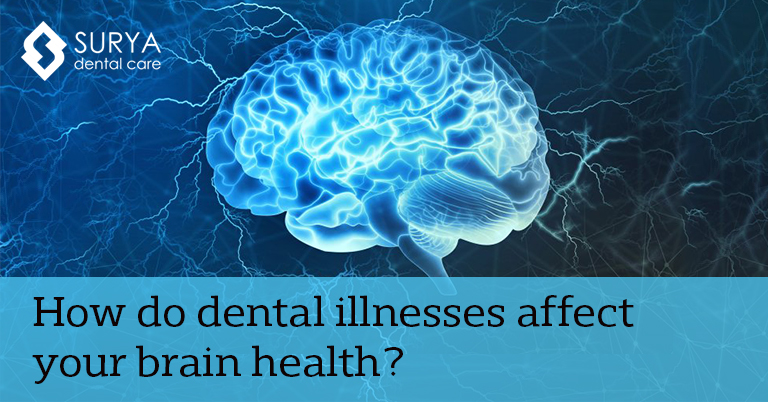
Your oral cavity has many fascinating interconnections with your total body wellness. Poor oral care will make you vulnerable to a multitude of systemic diseases like respiratory diseases, diabetes, heart diseases, and much more. Do you know that bacteria proliferated with untreated dental illnesses can affect your brain health?
For instance, people with missing teeth develop mild memory impairments. The hippocampus region in our brain receives sensory impulses and it is involved in memory. Jaw movements stimulate the sensory impulse and it will be lowered with teeth loss.
Similarly, the link between dental and mental health provides a way for various abnormalities in the brain. We have highlighted 3 common issues in this post. Keep reading to know more.
1) Gum disease and Alzheimer’s
Infection in gums if left untreated would end in harmful gum diseases like gingivitis. Periodontists say a microbe named “P.gingivalis” is the root cause for the progression of gum diseases. The bacteria in the advanced stage of gum diseases will secret a toxic fluid which when entered the bloodstream provoke cardiovascular problems, diabetes, chronic obstructive pulmonary disease(COPD), stroke, and rheumatoid arthritis.
Recent studies show that the gum infectious bacteria can relocate independently to the brain tissue.
When it reaches the brain, it secretes protein and enzyme by-products that destroy the nerve cells in the brain. It will have havoc on your brain health and tends to memory problems like Dementia, Alzheimer’s disease.
2) Teeth loss and Memory disorders
Similar to oral bacteria, missing teeth affect the brain’s cognitive functioning. We have mentioned this in the beginning. Let us see this in detail now.
Movement of jaw stimulated with chewing foods tends to produce more parotin hormones in the parotid gland. The parotin hormone increases the elasticity of blood vessels to activate the leukocyte function. It helps in improving the blood circulation in the brain whilst producing an insulin-like protein called NGF.
NGF (Nerve Growth Factor) is crucial for maintaining the sensory neurons and is linked to the cholinergic basal forebrain that is responsible for memory.
In simply, jaw movements are associated with certain neurobiological mechanisms of the brain for memory formation. When the chewing force is limited or meddles in jaw bone movements due to fewer teeth, it will harm your memory power.
3) TMJ Disorders and lowered brain functions
Temporomandibular Joint is a hinge that connects your jaw bone and skull. On the other hand, the brain nerves run through the spinal cord and base of the skull to the rest of our body. When there is a disruption or abnormal condition in the skull, it will affect the transmission of signals through the nerves.
The base of the skull locates behind the eyes and above the nasal cavity whereas the Temporomandibular joint locates on either side of your skull and in front of your eyes. Hence it is clear that when you encounter TMJ disorder due to teeth grinding or misaligned jaws, it will hurt your brain functions.
Recent researches show that people with prolonged TMJ disorders encounter changes in the brain’s white matter and it is reflected in lowered brain functions. Such victims encounter problems like dizziness, headaches, confusion, mental disorientation, and so on.
Bottom line
Similar to head injuries, improper oral care also make your brain health susceptible to various illness. Such abnormal mental conditions provoke with the biological pathways our oral cavity has.
Hence it is evident that taking care of your dental health is an indirect way to protect your mental health.



